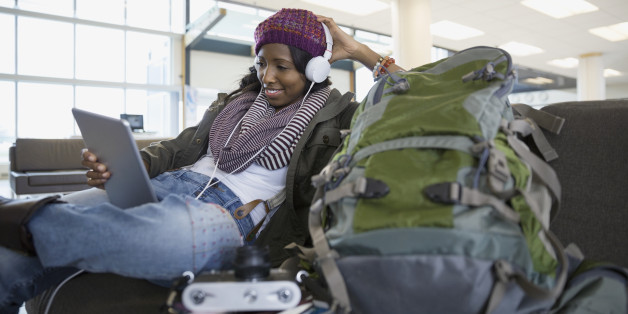WHAT A NIGERIAN STUDENT WHO GOT VISA TO STUDY ABROAD SHOULD KNOW

Now that you’ve been accepted into a study abroad program and has gotten your visa. It is important to know just how to get ready for the long haul. Being prepared will go a long way to get you in the right path so you don’t fall victim to unnecessary eventualities.
This article is designed to help you to be more aware of stuffs you’ll need to make your journey and stay in a foreign land smoother and rancour-free.
So here’s how to deal with important things like adjusting to a new environment, general expenses, what to bring, and more…
1. Get your finances in order
The moment you get accepted and secure your visa to study abroad, you need to make sure that your finances are well-taken care of so you’re not left stranded. First, estimate a budget.
Then, work to meet up with that target either by saving up or through sourcing for financial aid, grants and scholarships.
Of course, it can’t be possible to foresee every single cost. Nonetheless, do your best to think about what you’ll spend your money on once there and then start saving towards that goal.
Draw your budget around the following costs:
- Your food budget. Find out what typical meals cost and add it up for the entire duration of your study.
- Housing
- Transportation to and from class as well as to other strategic places
- Entertainment and sightseeing
- Emergencies, such as medical care
- Others
2. Seek information on your new home
You have to do some research on your new home country and the culture there before you take off. You can make use of the search engines. If it’s not an English-speaking country, then it will be in your best interest to at least learn some basic phrases in their local language.
Knowing language in particular will go a long way to help you in adjusting to the environment within your first few days of arrival. Study about the government and economy of that country too.
Do your research on the following;
- Good and bad areas of the community you’ll be staying
- Popular foods and drinks
- Where the closest Nigerian embassy is, and their contact info
- Local culture and traditions
- Common scams to keep an eye out for
- How the public transportation system works.
Once you have the following information at your fingertips, you’ll have a safer, enjoyable and more impactful study abroad experience.
3. Prepare the necessary paperwork
This is probably one of the most important processes involved in studying abroad. Ensuring that all your documents are in place and intact is critical as far as your study abroad is concerned. Your passport must not be misplaced at this moment for any reason.
Make sure you secure your visa at least one month before your trip. Usually, the country’s consulate will provide with all the information on your visa type. Understand the terms of your student visa.
Other documents you need to prepare may include copies of your medical reports, proof of settlement funds, etc. depending on the school or the country requirements.
4. Read the consular information sheet
Consular information sheets provide up to date travel information on any country in the world that you plan to visit. So it’s in your best interest to investigate this document for your study home country.
They cover topics such as entry regulations, the crime and security situation, drug penalties, road conditions, and the location of your native embassy, consulates, and consular agenci
5. Find out what stuff you really need
You don’t want to carry all your belongings to your new home. Remember that extra bag or overweight fees will result in less money to spend later. Therefore, you want to look out for that and really think about what you need to survive in your new home.
Restrict yourself to a few clothes and other items that you know you can use in a space of three to six months. You should also carry along a few reminders of home like a photo collage from your bedroom or any favourite item that can always make you feel homey whenever you start missing home.
6. Get insider info
Find people around you both online and offline who had already participated in the program you’re going for or those who are already in the school.
Try to get as much information as you can get from them regarding your new school.
Ask them about the kind of clothing you should acquire both before and after your arrival and also where to get them. Find out from them about some popular traditions and phrases.
7. Does your school offer additional information?
Some schools will have additional information for students who are planning to study, work or travel abroad. So you should find out if your own school has such information.
This is critical as it will help you to easily adjust to situations out there. They may also be able to provide you with information on any travel benefits for students such as how to save money on transportations, accommodation, and other resources
8. Have some handy cash
Your first few days will most likely be very busy ones, so you’ve got to carry along some handy cash. It is recommended that international students carry an equivalence of $100-$200 in the currency of your host country.
If you find it difficult obtaining the money at home, you can always use the ATMs at the airport once you arrive to withdraw some cash
9. Use these Packing tips
Here are a few packing tips for your trip:
- Carry power adapters for your electronic gadgets
- Bring enough toiletries to last you for at least one month
- Stick to three pairs of shoes
- Plan on buying towels and bed sheets when you arrive, instead of wasting space on that
- If you wear contact lenses or glasses, bring an extra pair along
- Ask your study abroad program for a suggested packing list
And remember — Travel light. Keep in mind that many of the items you want to bring are actually available abroad.
10. Book your flight: We are in the era when there are many flight-booking websites and apps. Therefore you don’t have to limit your search to one airline. Observe different offers.
Check if there are airlines that gives special discounts on student travels. Please ensure you have examined all competitive options before clicking the ‘buy’ button. Do not book flight on impulse.
You can however cancel a booking within some speculated hours if you need to have your decision reconsidered.
Safe trip!












